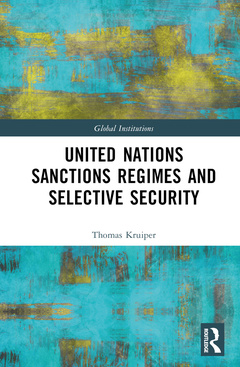Description
United Nations Sanctions Regimes and Selective Security
Global Institutions Series
Author: Kruiper Thomas
Language: English
Subjects for United Nations Sanctions Regimes and Selective Security:
· 15.6x23.4 cm · Hardback
Description
/li>Contents
/li>Readership
/li>Biography
/li>
This book investigates the selective nature of UN sanctions regimes with a specific focus on the post-Cold War era. Legally binding on all members, UN sanctions are the most effective and legitimate non-violent multilateral tools to respond to international security threats. They are also symbolically more powerful than unilateral or multilateral sanctions because they enjoy global support. However, while dozens of threats to international peace were met with UN sanctions since 1990, many others were not. How can we explain this incoherent approach? With a focus on the selectiveness, rather than effectiveness of UN sanctions the author reflects on the shifting geopolitical tensions between Security Council members and uses a variety of widely used academic datasets to provide a unique overview of what determines sanctions and sanctionable events. The primary audience will be scholars and students of international relations, international organizations, security studies, and political economy.
List of Figures
List of Tables
Acknowledgments
List of Abbreviations
Note on United Nations Documents
Chapter 1 – Introduction: United Nations Sanctions and Selective Security
The Selective Nature of UN Sanctions
After After Hegemony
Chapter 2 – A History of Sanctions and Selectivity
Sanctions and the League of Nations
UN Sanctions and the Cold War (1945-1989)
UN Sanctions Since 1990 – The Sanctions Decades
Contemporary UN Sanctions – More Targeted, Less Regimes
Chapter 3 – Presenting the Sanctionable Events Dataset: 1990 – 2022
Sanctions and Datasets
Sanctions and Norms
Sanctionable Events: 1990 – 2022
Proxies for Selectivity
Chapter 4 – Nuclear Proliferation and Selective UN Sanctions
Defining the Event
Nuclear proliferators before 1990
Nuclear Proliferators after 1990
Conclusions
Chapter 5 – Interstate Wars and Selective UN Sanctions
Defining the Event
A History of Interstate War and UN Responses
Interstate Wars and UN Sanctions Since 1990
Conclusions
Chapter 6 - Civil War and Selective UN Sanctions
Defining the Event
Selectivity in Time
Selectivity in Space
Governments vs. non-State Armed Groups
4 Hypotheses for Selectivity
Fuzzy Set Qualitative Comparative Analysis
A Shift in Selectivity: From Libya to Syria
Conclusions
Chapter 7 – Terrorism and Selective UN Sanctions
Defining the Event
State-Sponsored Terrorism and UN Sanctions since 1990
Al-Qaida and the War on Terror
UN Sanctions and on the War on Terror
Terrorism and Selective UN Sanctions
Conclusions
Chapter 8 – Coups d’état and Selective UN Sanctions
Defining the Event
A history of the offence - Coups d’état since 1946
Coups d’état and Selective UN Sanctions
Six Short Case Studies
Conclusions
Chapter 9 – Conclusions: United Nations Sanctions and Selective Security
United Nations Sanctions and Selective Security
Index
Thomas Kruiper (PhD) is an associate professor of International Relations at the Universidad Europea, Valencia. His research focuses on security studies and international sanctions. He also works as a development consultant in West Africa.




